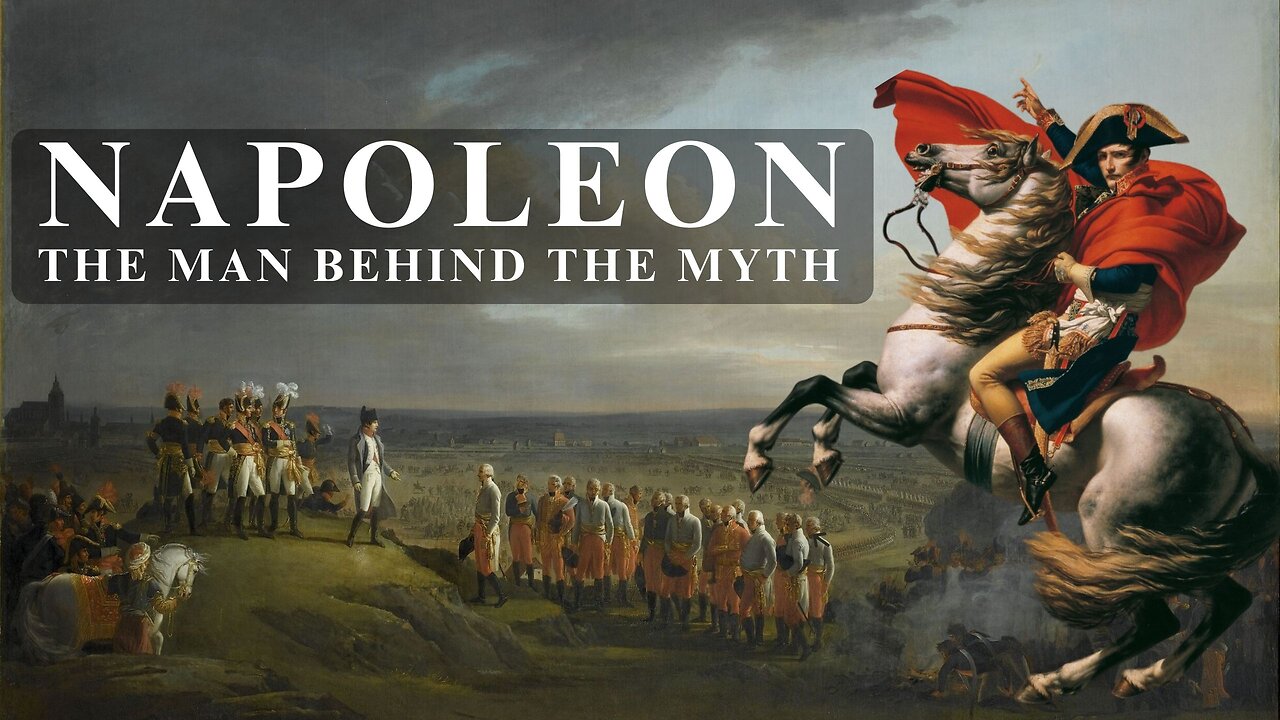Premium Only Content

Napoleon Bonaparte: The Man Behind the Myth
Napoleon Bonaparte: The Man Behind the Myth
Welcome to our channel. In this video, we embark on a fascinating journey through the extraordinary life of one of history's most iconic figures, Napoleon Bonaparte. From his humble beginnings on the island of Corsica to his rise as Emperor of France, Napoleon's story is a captivating tale of ambition, military brilliance, and political prowess.
Napoleon's Early Life: A Foundation for Greatness
Born on August 15, 1769, in Corsica, Napoleon's early years were marked by political turmoil and financial struggles. Despite these challenges, his parents, Carlo and Letizia, instilled in him a sense of ambition and resilience. At the age of nine, Napoleon was sent to mainland France to receive his education, where he excelled in subjects like mathematics and history. His time at the Royal Military School in Brienne and later at the École Militaire in Paris laid the groundwork for his future military career.
The Rise of a Military Prodigy: From Soldier to General
Napoleon's military genius first became evident during the Italian Campaign of 1796. His innovative strategies and decisive victories earned him a reputation as a brilliant and charismatic leader. However, it was the Egyptian Expedition that showcased both his ambition and his vulnerability, as he sought to disrupt British trade routes and establish a French presence in the Middle East.
The Coup of Brumaire: Seizing Political Power
In 1799, amidst political unrest and economic crisis, Napoleon seized control of the French government through the Coup of Brumaire. This bold move propelled him from a renowned military leader to a political force, setting the stage for his transformative vision of France. The creation of the Napoleonic Code and various administrative reforms during the Consulate period brought order and progress to the nation.
A Series of Victories: From Marengo to Austerlitz
Napoleon's strategic genius was further demonstrated in battles like Marengo, Austerlitz, and Friedland. His ability to adapt to changing circumstances and his innovative use of combined arms tactics secured his place as one of history's greatest military leaders. As Emperor of the French, he implemented significant economic and educational reforms, further consolidating his power and influence.
Master of Europe: The Napoleonic Wars
The Napoleonic Wars, spanning from 1803 to 1815, saw Napoleon's relentless pursuit of power and dominance. His triumphs at Austerlitz, Jena, and Friedland reshaped the political landscape of Europe. However, his ambition ultimately led to his downfall, as the disastrous Russian Campaign of 1812 and subsequent coalition offensives weakened his grip on power.
The Russian Campaign: The Beginning of the End
In 1812, Napoleon embarked on a grand campaign to conquer Russia, aiming for a swift victory that would expand French dominance in the East. Leading a massive army, he marched into the vast Russian Empire with confidence.
From the start, the campaign was riddled with difficulties. Napoleon faced the formidable Russian army, the immense expanse of the Russian landscape, and brutal weather conditions. The Russian military's scorched-earth tactics further complicated matters, stretching French supply lines and straining resources.
Among these challenges, Napoleon encountered the fierce Cossacks, skilled warriors of the steppes. Their guerilla warfare tactics and unmatched horsemanship struck fear into the French troops, testing Napoleon's strategic skills and adding another layer of difficulty to the campaign.
Despite early successes, including the capture of Moscow, Napoleon's army was unprepared for the harsh Russian winter. Bitter cold, dwindling supplies, and relentless Russian attacks led to a disastrous retreat. The once-mighty Grand Army was reduced to a fraction of its original strength.
The Russian campaign marked a turning point for Napoleon. The devastating losses shattered his aura of invincibility and exposed the flaws in his ambitious conquests. This failure emboldened European powers to unite against him, sparking a series of events that would lead to his downfall.
This campaign highlights the dangers of overextension and the importance of understanding local terrain, climate, and culture in military strategy. It underscores the necessity of strong supply lines and adaptable strategies.
The defeat in Russia signaled the decline of Napoleon's reign. It set the stage for his eventual abdication and exile, marking the beginning of the end for his empire. The Russian campaign stands as a cautionary tale, illustrating the limits of military might and the consequences of strategic miscalculations.
Napoleon and Josephine: A Complex Love Story
The love story between Napoleon and Josephine de Beauharnais is a tale of passion and devotion. Their marriage in 1796 was marked by intense affection and mutual admiration. However, political pressures and Josephine's inability to produce an heir led to their eventual separation, adding a layer of personal complexity to Napoleon's public life.
Elba and the Hundred Days: Napoleon's Comeback
After his abdication in 1814, Napoleon was exiled to Elba, but his ambition remained undiminished. In 1815, he made a daring escape and returned to France, igniting the period known as the Hundred Days. His brief resurgence of power culminated in the Battle of Waterloo, where he faced a decisive defeat that led to his final exile.
Waterloo: Defeat and Exile
The Battle of Waterloo on June 18, 1815, marked the end of Napoleon's dreams of conquest. Defeated by the Seventh Coalition, he was exiled to the remote island of Saint Helena, where he spent the remaining years of his life in captivity.
St. Helena: The Final Years
Napoleon's final years on Saint Helena were marked by declining health and isolation. Despite his confinement, he continued to exert his influence and reflect on his legacy. He died on May 5, 1821, but his impact on Europe and the world endured.
Legacy and Impact: Napoleon's Influence on Europe
Napoleon's legacy is a complex tapestry of military brilliance, legal reforms, and controversial conquests. His innovative military strategies and the Napoleonic Code left a lasting impact on warfare and legal systems. While his pursuit of power led to significant suffering, his contributions to military strategy and governance continue to be studied and debated.
Thank you for joining us on this journey through the life of Napoleon Bonaparte. His story is a testament to the complexities of power, ambition, and leadership. Stay tuned for more fascinating historical explorations on our channel. Don't forget to like, share, and subscribe!
-
 44:41
44:41
Inverted World Live
10 hours agoPolitical Violence in Minnesota w/ AK Kamara
132K12 -
 6:29:40
6:29:40
SpartakusLIVE
10 hours ago#1 Massive MEAT-HEAD can't stop WINNING, can't stop FLEXING
73K -
 5:09:25
5:09:25
Drew Hernandez
10 hours agoGIDEON AI THREAT DETECTION SOFTWARE PUSH & NEW EPSTEIN EMAIL LEAK?
39.1K21 -
 2:03:51
2:03:51
TimcastIRL
6 hours agoTrans Minneapolis Shooter BLAMED Massacre On Mom & Gender Transition | Timcast IRL
176K296 -
 47:29
47:29
Man in America
13 hours agoIT DOESN'T ADD UP: The Trans Shooter's Story Is FULL of Holes
47.3K44 -
 3:59:36
3:59:36
StevieTLIVE
6 hours agoFriday Night Warzone HYPE
38.3K1 -
 3:47:10
3:47:10
SynthTrax & DJ Cheezus Livestreams
1 day agoFriday Night Synthwave 80s 90s Electronica and more DJ MIX Livestream Michael Jackson / AI Art Compilation Edition
46K -
 1:03:57
1:03:57
Sarah Westall
6 hours agoMara Lago Accord Joins the Fed, Fed Waves the White Flag & more w/ Andy Schectman
30K -
 2:44:12
2:44:12
I_Came_With_Fire_Podcast
1 day ago*BREAKING* Special Guest Katarina Szulc
38.3K5 -
 3:22:20
3:22:20
megimu32
6 hours agoOFF THE SUBJECT: FAFO Friday! Bodycams & Mario Kart Mayhem!
25.7K4